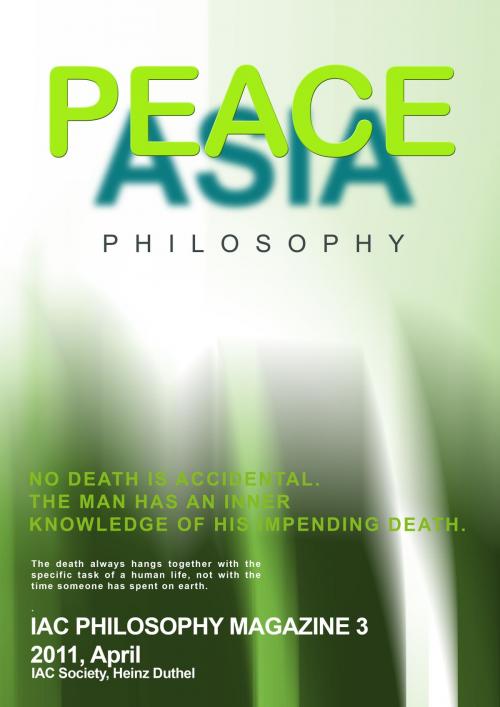Peace Philosophy Magazine III
No death is accidental. The man has an inner knowledge of his impending death.
Nonfiction, Religion & Spirituality, Eastern Religions, Zen Buddhism, Buddhism, Philosophy| Author: | Heinz Duthel | ISBN: | 1230000135723 |
| Publisher: | Heinz Duthel | Publication: | May 24, 2013 |
| Imprint: | Language: | English |
| Author: | Heinz Duthel |
| ISBN: | 1230000135723 |
| Publisher: | Heinz Duthel |
| Publication: | May 24, 2013 |
| Imprint: | |
| Language: | English |
Doctrines, or dogmas, or rituals, or books, or temples, or forms, are but secondary details.
WE HELP OURSELVES, NOT THE WORLD
Before considering further how devotion to duty helps us in our spiritual progress, let me place before you in a brief compass another aspect of what we in India mean by Karma. In every religion there are three parts: philosophy, mythology, and ritual.
Philosophy of course is the essence of every religion; mythology explains and illustrates it by means of the more or less legendary lives of great men, stories and fables of wonderful things, and so on; ritual gives to that philosophy a still more concrete form, so that every one may grasp it — ritual is in fact concretised philosophy.
This ritual is Karma; it is necessary in every religion, because most of us cannot understand abstract spiritual things until we grow much spiritually. It is easy for men to think that they can understand anything; but when it comes to practical experience, they find that abstract ideas are often very hard to comprehend. Therefore symbols are of great help, and we cannot dispense with the symbolical method of putting things before us. From time immemorial symbols have been used by all kinds of religions. In one sense we cannot think but in symbols; words themselves are symbols of thought. In another sense everything in the universe may be looked upon as a symbol. The whole universe is a symbol, and God is the essence behind. This kind of symbology is not simply the creation of man; it is not that certain people belonging to a religion sit down together and think out certain symbols, and bring them into existence out of their own minds. The symbols of religion have a natural growth. Otherwise, why is it that certain symbols are associated with certain ideas in the mind of almost every one? Certain symbols are universally prevalent. Many of you may think that the cross first came into existence as a symbol in connection with the Christian religion, but as a matter of fact it existed before Christianity was, before Moses was born, before the Vedas were given out, before there was any human record of human things. The cross may be found to have been in existence among the Aztecs and the Phoenicians; every race seems to have had the cross. Again, the symbol of the crucified Saviour, of a man crucified upon a cross, appears to have been known to almost every nation. The circle has been a great symbol throughout the world. Then there is the most universal of all symbols, the Swastika.
Doctrines, or dogmas, or rituals, or books, or temples, or forms, are but secondary details.
WE HELP OURSELVES, NOT THE WORLD
Before considering further how devotion to duty helps us in our spiritual progress, let me place before you in a brief compass another aspect of what we in India mean by Karma. In every religion there are three parts: philosophy, mythology, and ritual.
Philosophy of course is the essence of every religion; mythology explains and illustrates it by means of the more or less legendary lives of great men, stories and fables of wonderful things, and so on; ritual gives to that philosophy a still more concrete form, so that every one may grasp it — ritual is in fact concretised philosophy.
This ritual is Karma; it is necessary in every religion, because most of us cannot understand abstract spiritual things until we grow much spiritually. It is easy for men to think that they can understand anything; but when it comes to practical experience, they find that abstract ideas are often very hard to comprehend. Therefore symbols are of great help, and we cannot dispense with the symbolical method of putting things before us. From time immemorial symbols have been used by all kinds of religions. In one sense we cannot think but in symbols; words themselves are symbols of thought. In another sense everything in the universe may be looked upon as a symbol. The whole universe is a symbol, and God is the essence behind. This kind of symbology is not simply the creation of man; it is not that certain people belonging to a religion sit down together and think out certain symbols, and bring them into existence out of their own minds. The symbols of religion have a natural growth. Otherwise, why is it that certain symbols are associated with certain ideas in the mind of almost every one? Certain symbols are universally prevalent. Many of you may think that the cross first came into existence as a symbol in connection with the Christian religion, but as a matter of fact it existed before Christianity was, before Moses was born, before the Vedas were given out, before there was any human record of human things. The cross may be found to have been in existence among the Aztecs and the Phoenicians; every race seems to have had the cross. Again, the symbol of the crucified Saviour, of a man crucified upon a cross, appears to have been known to almost every nation. The circle has been a great symbol throughout the world. Then there is the most universal of all symbols, the Swastika.















